Anyone who has ever rushed to an airport, bus station, or train station, only to be confronted with the dreaded phrase “cancelled,” or “delayed” will doubtless empathize with the stress of travelling. Add to this the madness and emotions brought to the table during the holidays – anticipation to see family/loved ones, tying up loose ends from work – and you have the recipe for the 1987 comedy “Planes, Trains & Automobiles.” By Writer/Director John Hughes, the movie is a zany yet oddly transformative look at two strangers who become unwitting travel companions as one tries to get home for Thanksgiving.
Steve Martin (“Father of the Bride,” “The Pink Panther”) plays Neal Page, a marketing exec who leaves an appointment in New York City with one goal in mind – catching the six o’clock flight to Chicago and keeping a promise to his wife to be home by nine. A co-worker warns him of the impossibility of this, and to just catch the eight; Page doesn’t listen, and soon undergoes a comedy of errors including missing one cab, having another stolen by a stranger, being downgraded from 1st class to coach, and, of course, getting seated next to the cab-stealing-stranger/new-friend Del Griffith (John Candy, “Spaceballs“), an overly-friendly shower curtain ring salesman.
The two couldn’t be at greater odds: Neal is a reserved, all-business type who doesn’t like small talk; Del is a garrulous motor mouth who never seems to run out of fuel. Neal is also kind of a jerk – in repayment for accidentally stealing his cab, Del offers him “a hot dog and a beer” to make it up to him, which Neal scoffs at (is it just me, or does that sound like the best offer ever??).
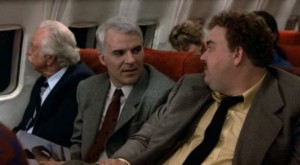
However, the two become quickly intertwined – for better or worse – as their flight has to land in Kansas due to inclement weather in Chicago. Del, a wizened traveler, saves the day by offering to share his motel room with Neal when Neal finds all the rooms in town booked up. Thus begins an adventure home between the two that involves showers that don’t work, being robbed, taking a train that breaks down, Neal getting beat up, and fights, anger, and tempers that flare at the drop of a hat.
The character development in the film is top-of-the-line, featuring interpersonal looks at the two men often missing from films of its type. Candy’s Griffith is a jovial and oblivious-of-his-own-obnoxiousness man who looks at the world with youthful wonder. Martin’s Page, however, is the type of man who’s not used to talking to others outside of his small world. He resents being stuck in the situation, and where Del readily accepts their predicament with humor, Page fights it hair, tooth, and nail, often lashing out at Del in anger.
Sometimes you can’t blame him, during scenes in which his shower cuts off mid-way, or when he rents a car which turns out to be missing from the lot, but in other situations he comes off as plain mean. In one protracted scene, he criticizes Del with deep cutting insults that take things to a much more personal level.
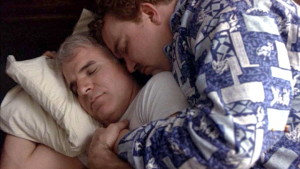 However, “Planes, Trains & Automobiles” takes the time to look deeper at situations like this, educating along the way. Instead of escalating the fight, Del, hurt, simply responds, “You know, I could be a cynic like you. But my wife likes me, my customers like me. I’m not changing.” The movie presents Neal’s anger as humor (as it honestly is funny) but doesn’t undercut the impact it has on Del. The two reconcile, forming a bond (though unwilling at times) that sees Del standing up for Neal later in the film. Too often films like to present flat characters full of actions they never have to answer for. It’s good to see a film that holds its characters responsible for their actions, a point which lesser movies simply gloss over.
However, “Planes, Trains & Automobiles” takes the time to look deeper at situations like this, educating along the way. Instead of escalating the fight, Del, hurt, simply responds, “You know, I could be a cynic like you. But my wife likes me, my customers like me. I’m not changing.” The movie presents Neal’s anger as humor (as it honestly is funny) but doesn’t undercut the impact it has on Del. The two reconcile, forming a bond (though unwilling at times) that sees Del standing up for Neal later in the film. Too often films like to present flat characters full of actions they never have to answer for. It’s good to see a film that holds its characters responsible for their actions, a point which lesser movies simply gloss over.
Candy and Martin honestly couldn’t been better cast in their roles as Del and Neal. Martin, who has previously played more comic characters in movies such as “Bowfinger” and “Three Amigos” is toned down and structured as all-business Neal. And Candy, who has never appeared more lovable as Del, also makes a departure from more sarcastic roles like “The Great Outdoors” and “Uncle Buck.” Together, their performances make “Planes, Trains & Automobiles” an unlikely hit, but one that works almost solely because of the talent they bring to their roles.
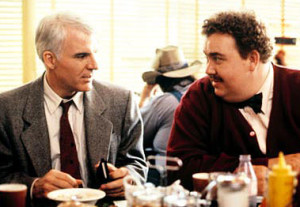
Credit, of course, is owed to John Hughes for presenting a script that allows his characters to come into their own without being constrained with an overabundance of bizarre and over-the-top situations. Hughes’ movies have a way of making the mundane iconic (detention in “The Breakfast Club,” a sick day in “Ferris Bueller’s Day Off”) without reaching unbelievable proportions. When Neal flips out on a rental car clerk, his anger is understandable even if his choice of words leaves a lot to be desired (aside from a similar performance by Michael Keaton in “The Paper,” I’ve never heard so many f-bombs in one monologue). However, the movie, never missing a step, vindicates the poor clerk by having her give it right back to him. There’s humor in his frustration because it’s a situation we’ve all been in and can understand.
“Planes, Trains & Automobiles” is, on the surface, another in a line of dysfunctional buddy comedies that are a dime a dozen. However, it’s also a lot more. It offers plenty of humorous scenes (one involving Martin and Candy laughing hysterically as their car catches on fire, with Candy later imploring a cop to let them go because his friend has to get home for Thanksgiving is so naively hysterical you can’t help but laugh out loud), but also offers many softer moments that tug on your heartstrings in all the right places. The end of the movie is starkly different from the beginning, with both men having learned something along the way, and offers one of the most tender, joy-inducing payoffs I’ve seen in years.
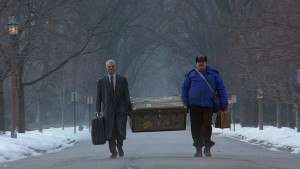 This is one of those movies, like “It’s a Wonderful Life” or “A Christmas Story” that defines a holiday. Christmas has so many films to choose from, where the often glossed over Thanksgiving has but a few. “Planes, Trains & Automobiles” is, and should be, required viewing for anyone wanting to get into the spirit of this start to the holiday season. It’s humor will make you laugh, it’s story will carry you along, and its surprising warmth will beg for a place on your movie shelf so you can relive this classic again and again – as it rightly deserves to be.
This is one of those movies, like “It’s a Wonderful Life” or “A Christmas Story” that defines a holiday. Christmas has so many films to choose from, where the often glossed over Thanksgiving has but a few. “Planes, Trains & Automobiles” is, and should be, required viewing for anyone wanting to get into the spirit of this start to the holiday season. It’s humor will make you laugh, it’s story will carry you along, and its surprising warmth will beg for a place on your movie shelf so you can relive this classic again and again – as it rightly deserves to be.
– by Mark Ziobro
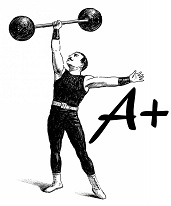

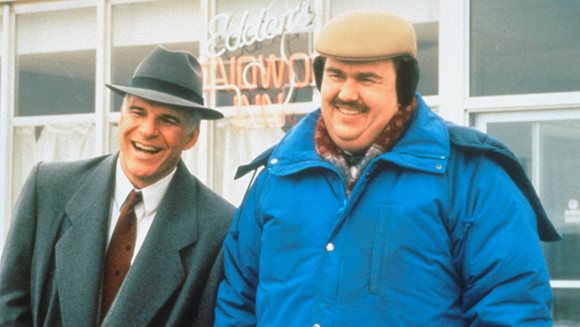
1 Comment
Pingback: » Spaceballs (PG)